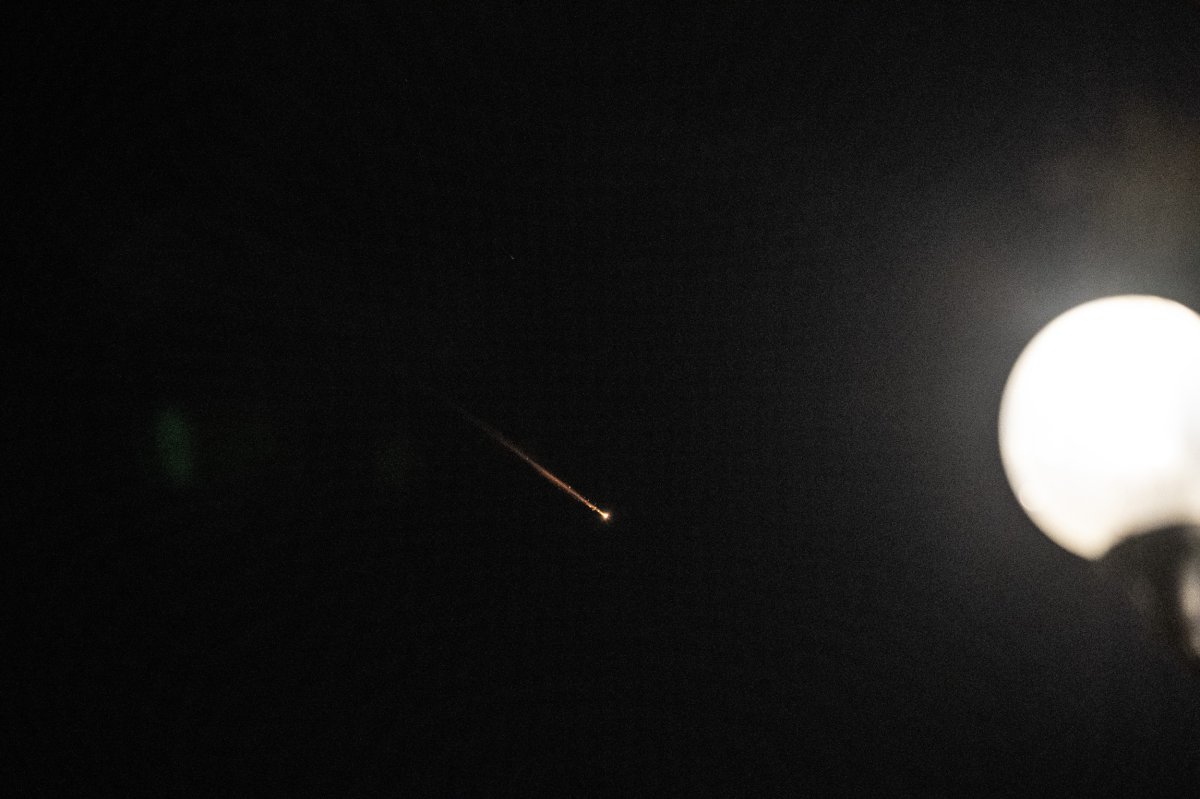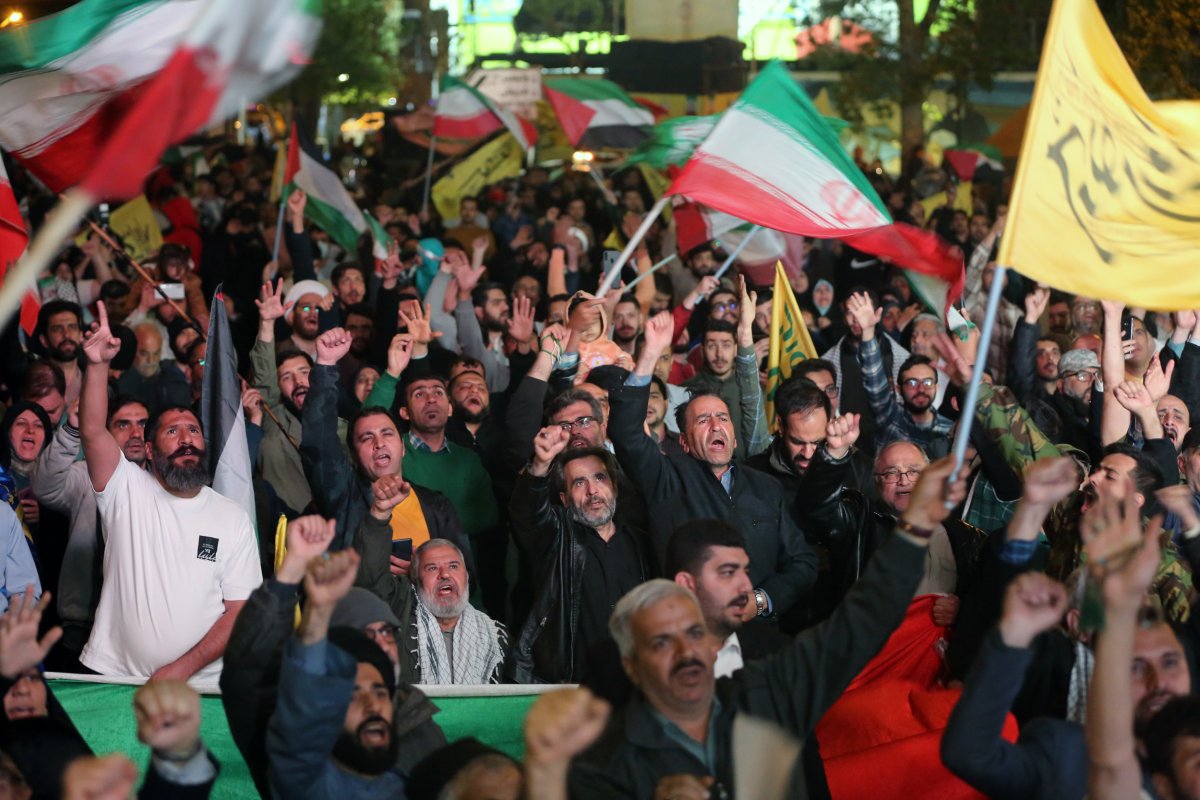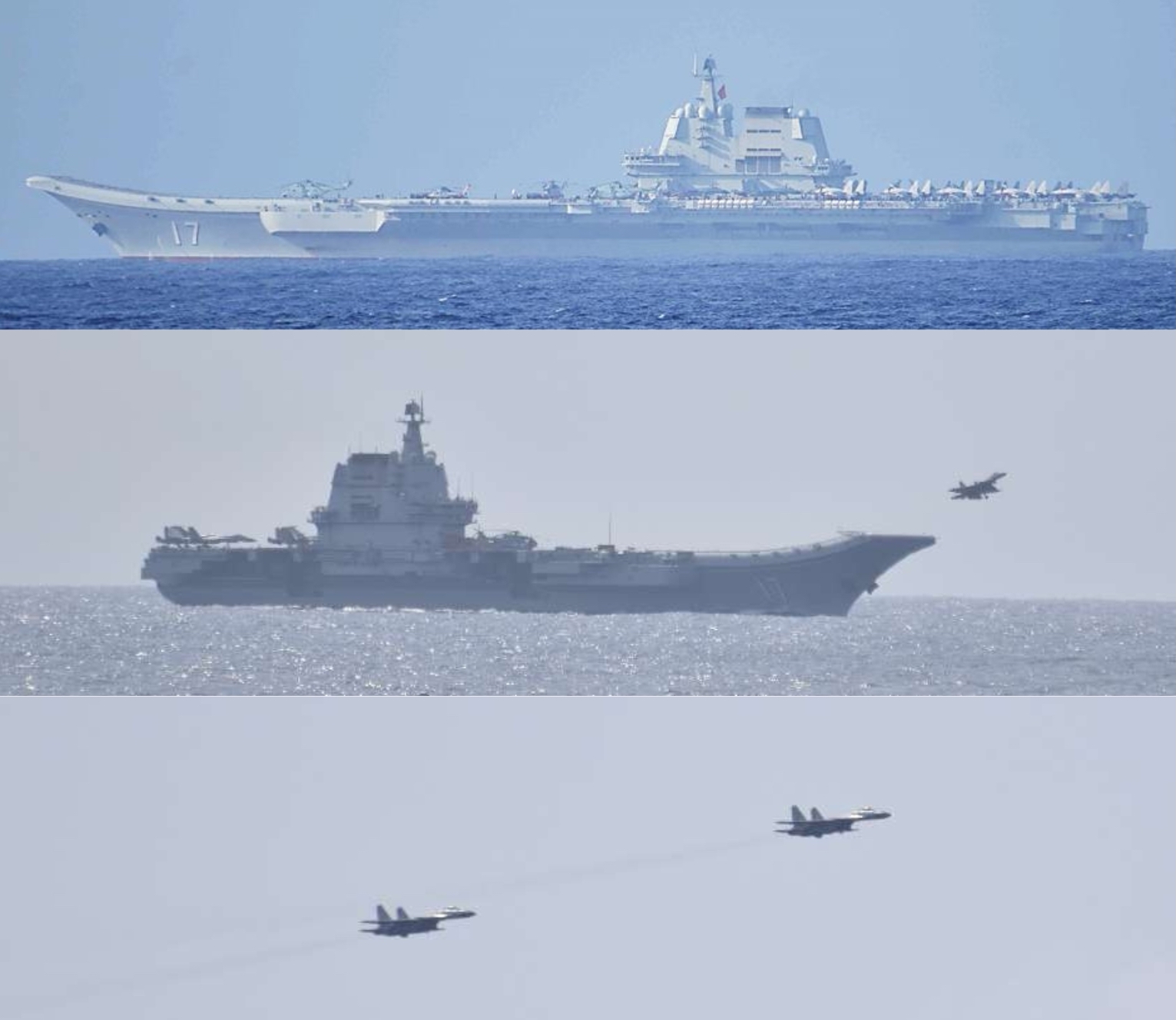After Iran conducted an unprecedented missile and drone attack against Israel in response to a deadly strike against its embassy complex in Syria, the Islamic Republic's top diplomat in the United States issued a strongly worded letter outlining the legal basis behind the operation and a warning against further escalation.
The letter, obtained by Newsweek, was written by Iranian Ambassador to the United Nations Amir Saied Iravani and addressed to U.N. Secretary-General António Guterres and U.N. Security Council President Vanessa Frazier. It officially informed U.N. leadership that, "in the late hours of 13 April 2024, the Islamic Republic of Iran carried out a series of military strikes on Israeli military objectives."
The document referenced earlier warnings of a "decisive response" to Israel's killing of seven Iranian military personnel. including two senior Islamic Revolutionary Guard Corps (IRGC) commanders, at an Iranian consular building in Damascus 10 days ago, an act that Iravani argued constituted a violation of the U.N. Charter.
"This action was in the exercise of Iran's inherent right to self-defense as outlined in Article 51 of the Charter of the United Nations," the letter said, "and in response to the Israeli recurring military aggressions, particularly its armed attack on 1st April 2024 against Iranian diplomatic premises, in the defiance of Article 2 (4) of the Charter of the United Nations."
Article 2 (4) of the U.N. Charter states that, "All Members shall refrain in their international relations from the threat or use of force against the territorial integrity or political independence of any State, or in any other manner inconsistent with the Purposes of the United Nations."
The historic Iranian attack comes, however, amid a long-running conflict between the arch-foes that has been significantly aggravated by the six-month war between the Israel Defense Forces (IDF) and the Palestinian Hamas movement. With tensions already soaring across the Middle East, Iravani lamented the U.N. Security Council's failure to act and warned it was Israel that had escalated the situation to the point that it necessitated a direct attack.

"Regrettably, the United Nations Security Council has failed in its duty to maintain international peace and security, allowing the Israeli regime to transgress red lines and violate the fundamental principles of international law," Iravani wrote. "Such violations have exacerbated tensions in the region and threatened regional and international peace and security."
Iravani reiterated Iran's commitment to the U.N. Charter and asserted that "it does not seek escalation or conflict in the region." At the same time, he emphasized that the Islamic Republic was prepared to take further action should Israel choose to strike back.
"While warning about any further military provocations by the Israeli regime," Iravani wrote, "the Islamic Republic of Iran reaffirms its unwavering determination to defend its people, national security and interests, sovereignty, and territorial integrity against any threat or acts of aggression and to respond to any such threat or aggressions vigorously and in accordance with international law."
"The Islamic Republic of Iran will not hesitate to exercise its inherent right of self-defense when required," he added. "Should the Israeli regime commit any military aggression again, Iran's response will assuredly and decisively be stronger, and more resolute."
Israeli Ambassador to the U.N. Gilad Erdan also reached out to the U.N. Security Council in the wake of the Iranian strike, which he referred to as a "clear violation of the UN Charter and international law" and a "severe and dangerous escalation" in his own letter.
He called on the U.N. Security Council to convene "immediately to unequivocally condemn Iran for these grave violations and immediately act to designate the IRGC as a terrorist organization."
Israeli officials have yet to release any comprehensive estimates of damage or casualties from the Iranian bombardment. The Israel Defense Forces (IDF) reported Wednesday, in the aftermath of the attack, that Chief of the General Staff Lieutenant General Herzi Halevi was conducting a "situational assessment" with senior military officials.
Earlier, IDF spokesperson Rear Admiral Daniel Hagari stated that "the vast majority" of more than 200 Iranian cruise missiles and drones "were intercepted outside of the State of Israel's borders by our Aerial Defense Array," while he said at least one IDF base in southern Israel was hit and one child injured.
Meanwhile, Israel faced simultaneous attacks from other foes aligned with the broader Iran-backed "Axis of Resistance."
From the northern border with Lebanon, the Hezbollah movement claimed at least two separate attacks "in support of our steadfast Palestinian people in the Gaza Strip and in support of their brave and honorable resistance, and in response to the Israeli night raids that targeted a number of safe villages and towns." The IDF said it conducted retaliatory strikes against southern Lebanon in response.
Attacks were also reported from Yemen, which hosts the Ansar Allah, or Houthi, movement and from Iraq, home to an array of Iran-aligned militias that have operated under the banner of the "Islamic Resistance in Iraq" in that country and neighboring Syria.

In a statement issued late Wednesday, President Joe Biden stated that "Iran—and its proxies operating out of Yemen, Syria and Iraq—launched an unprecedented air attack against military facilities in Israel," and issued his condemnation "in the strongest possible terms."
Biden also credited U.S. military moves with helping Israel to defend against the Iranian attack.
"At my direction, to support the defense of Israel, the U.S. military moved aircraft and ballistic missile defense destroyers to the region over the course of the past week," Biden said. "Thanks to these deployments and the extraordinary skill of our servicemembers, we helped Israel take down nearly all of the incoming drones and missiles."
The president said he spoke with Israeli Prime Minister Benjamin Netanyahu, reaffirming Washington's "ironclad commitment to the security of Israel," which the U.S. leader said "demonstrated a remarkable capacity to defend against and defeat even unprecedented attacks – sending a clear message to its foes that they cannot effectively threaten the security of Israel."
Biden vowed to convene with fellow leaders of the Group of Seven (G70, which also includes Canada, France, Germany, Italy, Japan, the United Kingdom and the European Union, "to coordinate a united diplomatic response to Iran's brazen attack." He said no U.S. forces or facilities had come under fire in the Iranian attack, but "we will remain vigilant to all threats and will not hesitate to take all necessary action to protect our people."
Prior to the attack and amid repeated Iranian vows to carry out revenge over the deadly Israeli strike in Syria, Biden's message to Tehran during a press conference Friday was simply, "Don't."
But both Tehran and Washington had also engaged in a marathon of diplomatic contacts, particularly with countries in the region, in the wake of Israel's attack on the Iranian consular building in Syria. Thus far, neither the U.S. nor Israel have offered any indication of a direct military response, and, while Secretary of State Antony Blinken emphasized in a statement the Biden administration's commitment to supporting Israel and ensuring the safety of U.S. personnel in the region, he also asserted that "we do not seek escalation."
The Iranian attack has also not yet been met with the same level of regional condemnation directed toward Israel's strike on April 1, though countries such as Egypt and Saudi Arabia voiced concern over escalating tensions.
The Chinese Foreign Ministry, too, cautioned against further escalations, tracing the root of the crisis to the war in Gaza, while Russian Foreign Minister Sergey Lavrov spoke with Iranian counterpart Hossein Amir-Abdollahian to reiterate his condemnation of Israel's attack on Iranian personnel in Syria and call for strengthening coordination and cooperation.
U.N. Secretary-General António Guterres warned any further escalations could push the region even closer to an all-out conflict.
"I am deeply alarmed about the very real danger of a devastating region-wide escalation," Guterres said in a statement. "I urge all parties to exercise maximum restraint to avoid any action that could lead to major military confrontations on multiple fronts in the Middle East."
"I have repeatedly stressed," he added, "that neither the region nor the world can afford another war."
Uncommon Knowledge
Newsweek is committed to challenging conventional wisdom and finding connections in the search for common ground.
Newsweek is committed to challenging conventional wisdom and finding connections in the search for common ground.
About the writer
Based in his hometown of Staten Island, New York City, Tom O'Connor is an award-winning Senior Writer of Foreign Policy ... Read more
To read how Newsweek uses AI as a newsroom tool, Click here.








